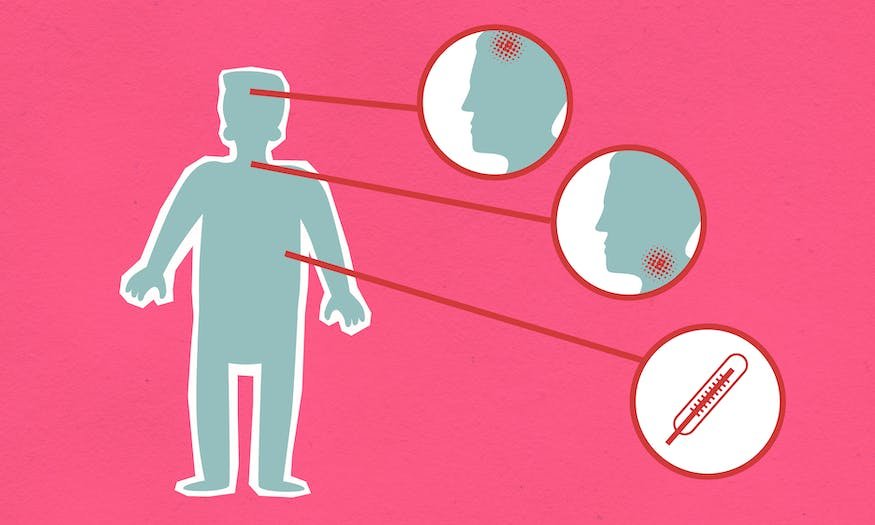Sleeping is one of the best remedies to fight an infection, but it’s not easy to do when you’re fighting a sore throat.
Suppose you wake up four to five times during the night with an unbearable pain in your throat. Or with a cough cold, and a feeling of dryness and inflammation. You know that all this is enough for you not to have a good night’s sleep, taking you to the one you can’t recover for the next day.
You don’t have to suffer anymore, and to help you.
We’re sharing ten treatment tips to help you sleep better at night if you have a sore throat.
-
Before you go to bed, take a warm shower or bath.
Meanwhile, make a conscious effort to take a deep breath. Warm water helps reduce stress and relax muscles.
-
Choose non-caffeinated drinks over coffee, and don’t drink alcohol.
On your quest to get a good night’s sleep, the last thing you need is a dry throat. Unfortunately, both caffeine and alcohol are prone to dryness. These drinks irritate the throat and make your peaceful sleep a constant restlessness.
-
Use a warm compress on the throat area.
Whether it’s a flannel sheet warmed by your dryer or a towel soaked in hot water, putting something warm around your throat will help soothe it. Heated compresses are highly effective when you need to provide a sense of relief.
-
Turn off your cell phone before snuggling.
Our modern obsession with electronics can, unfortunately, contribute to sleep problems. Adding a sore throat to this obsession can make it difficult to fall asleep. When you lay your head on the pillow, remember it’s time to rest. Ideally, it would help if you did not use electronic devices for half an hour before bed. Put your smartphone and laptop aside, and let your cozy bed and warm blankets lull you into a deep sleep.
-
Use medication after consulting your doctor or pharmacist.
Over-the-counter medications such as throat sprays can help relieve pain overnight. Throat spray contains the active substance flurbiprofen, which immediately reduces sore throats for up to 6 hours, so you get a good night’s sleep.
-
Organize your bedside table and be prepared.
Unless you want to go to the bathroom, stay in the comfort of your bed, looking for relief from your sore throat. Prepare water and throat medicine in advance and place them on your bedside table so they are always close at hand.
-
Always keep the same rest routine.
Always keeping the same routine helps you calm down before going to sleep. We recommend you always keep the same ritual to find peace of mind before a good night’s rest.
-
Raise the top of your mattress to have a slight slope.
Instead of raising your upper body with the help of pillows, lift the upper part of your mattress. Gravity will do the rest of the work while you sleep.
-
Create a little extra moisture in the air.
Humidifiers are great for sleeping companions. Turn it on overnight to release moisture into the air. It will also help prevent your sore throat from drying out and reduce any other cold symptoms you may be experiencing.
-
Keep your bed clean.
Wash your sheets every week. Allergens like dust mites often lurk in your bedding. These microscopic pests can irritate your throat, especially if you have allergies.
Sore throats tend to be worse at night. Taking care of a sore throat from coughing while trying to rest can irritate you. Put these tips into practice so you don’t have that problem again.
It is important to note that humidity levels must be monitored, and humidifiers must be appropriately maintained, disinfected, and cleaned. While extremely useful, humidifiers can quickly become a breeding ground for germs and can adversely affect your health if the humidity in your room is too high.
If symptoms persist, consult a doctor.
Why do coughs get worse at night?
Several things could make nighttime coughing worse.
-
After a long day, your nose drips:
If you have a cold or allergies, your throat may be full of mucus. The name for this is “postnasal drip.” Mucus could hurt your throat and wake you up coughing.
-
Arid air
If you use your heater or air conditioner at night, the air in your bedroom may get dryer. If you already have a chesty cough, the dry air could hurt your throat and worsen it.
-
Laying Down
When you lie down, you might cough more because gravity causes mucus to build up in your lungs. Changing positions can also stir up the fluid in the lungs, which makes it more likely that a cough will start.
-
Reflux:
When stomach acid moves back into the esophagus, it can irritate the lining of the esophagus and make you cough. This is called acid reflux or gastroesophageal reflux disease (GERD). This could be more obvious after going to bed since lying down can speed up the rate at which stomach acid moves up the esophagus.
-
Asthma:
Some asthma symptoms, like breathing and fits that come on quickly, might worsen at night. This is what doctors call wheezing at night. It’s unclear what the exact cause is, but it could have something to do with the body’s circadian rhythms, changing hormone levels, or inflammation.
-
Higher level of awareness
When you sleep, your body is more likely to be hurt by smog, allergens, and dust. This increased sensitivity might make someone cough.
It’s important to know that these are the most fundamental reasons people cough at night. If your cough is severe or won’t go away, you should see a doctor for a good diagnosis and treatment of the common cold and cough.
Read More: How To Get Online Medical Certificate For Covid-19
Is having a sore throat before a cold normal?
Colds often cause a sore throat, and you probably felt it coming on. A sore throat is often one of the first signs of a viral infection, like a cold and cough or the flu. When a virus gets into your body, it can irritate and inflame your throat, making it feel sore, painful, or scratchy.
The immune system usually responds with a sore throat when a virus enters the body. The body’s immune cells might irritate and swell the throat’s tissues to kill the virus. Because of the inflammation, it may be hard to say words or breathe.
It’s important to know that viruses don’t always cause sore throats.
Allergies, dry air, and throat soreness from smoking and screaming can also cause throat pain.
A sore throat is more likely caused by a cold or the flu if it comes with other symptoms like coughing, sneezing, a runny nose, or extreme tiredness.
If you have a sore throat, taking care of yourself by getting enough rest, drinking much water, and using over-the-counter pain relievers like throat lozenges or warm saltwater gargles is essential. If the sore throat from coughing lasts over a few days or comes with other severe symptoms, it’s best to see a doctor to get a good diagnosis and determine the best way to treat it.
How long should a cough last?
How long a cough lasts depends on the person and the cause of the cough. Most coughs caused by colds or other lung infections will disappear in a week or two. Remember that some coughs can last longer than others, mainly if other problems occur.
Here are some general rules for how to treat coughs caused by different things:
-
Coughing spells:
Short-term illnesses like the flu or the common cold often cause a strong cough. It usually lasts less than three weeks and improves when the primary disease improves.
-
Hacking quickly
Coughs going on for three to eight weeks are called subacute coughs. Several medical conditions, such as postnasal drip, sinusitis, and long-term respiratory infections, can cause this problem. A prolonged cough usually goes away on its own or with a doctor’s help.
-
Constant coughing
A cough lasting more than eight weeks is called “persistent.” Asthma, allergies, GERD, chronic bronchitis, and some medicines can be triggers. Chronic coughing needs a complete evaluation by a medical professional to find and treat the cause.
What are the worst days of a cold?
The first few days of a cold are usually when the symptoms are the worst. There’s a chance that these signs are more popular right now:
-
Aching Throat:
At the start of a cold, a sore or scratchy throat is one of the first things people notice.
-
Congestion:
Nasal congestion is a typical sign of the common cold, and it can be dry or wet. This could make you feel uncomfortable and make it hard to breathe deeply.
-
Sneezing:
Sneezing is a common sign of a cold; at first, it may happen a lot.
-
Coughing:
When you have a cold, coughing is a common sign, especially in the early stages. It might start dry and annoying, but it generally turns into a cough that makes mucus come up.
-
Fatigue:
Many people constantly feel tired and sick during the early stages of a cold. People often feel tired and need more energy.
-
Minor pains and aches
Some people may also have mild to severe muscle pain or pains with a cold.
What are the natural ways to fight cold and sore throat?
Each situation can change the most appropriate way to relieve a sore throat. However, it is essential to note that this is a relatively easy symptom to control.
Check out a summary of the tips presented so far:
- Drink plenty of water to avoid throat dryness, preventing or relieving pain;
- Prefer hot foods to relieve pain and reduce discomfort;
- Liquid foods, such as soups and broths, are more suitable for these situations, as they have a lower risk of injuring the inflamed region;
- Room humidifiers are indicated for the prevention and as treatment support;
- Rest and avoid straining your voice;
- To moisten your throat, you can also take a warm shower. It is an exciting option to facilitate rest, especially during the night;
- Pain relievers or anti-inflammatory medications can ease a sore throat. Remember to consult your Telehealthdr for medicine for the common cold and cough.
- Keeping the environment clean and free of dust or pet hair is an excellent way to prevent a sore throat caused by allergies.
We hope that these recommendations are helpful in relieving your sore throat, as they are indicated as the leading causes of this symptom.
If the pain is resistant, worsens, or lasts for an extended period, longer than a week, seek specialized medical attention for further examinations.






Leave A Comment